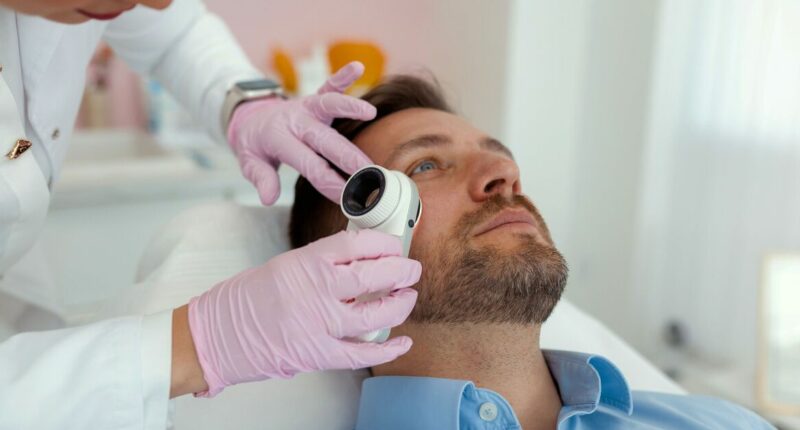Share this @internewscast.com
A UK grandmother-of-six has advised Britons to apply SPF-50 sun tan lotion while becoming the first patient to undergo a new treatment that may address a harsh form of skin cancer. The study, known as SCC-AFTER, is exploring if adding radiotherapy following surgery can lower the chance of high-risk squamous cell carcinoma (SCC) recurring.
Ranked as the second-most common type of non-melanoma skin cancer, SCC has at least 50,000 cases identified in the UK annually, with an alarming 5 percent increase each year. Pauline Short, 76 – a mother-of-five from Sale, Greater Manchester – expressed to the Daily Express her pride and relief in being the inaugural patient in the SCC national clinical study at The Christie in Manchester.
The experience has heightened her awareness of sun protection, as she now uses SPF-50 lotion and wears a hat while gardening. Pauline, who enjoys gardening and solving crosswords, is also anticipating a family vacation at Center Parcs in October.
Reflecting on her shock upon receiving the cancer diagnosis, she shared: “You never think it is going to happen to you. I had never been one to lie out in the sun and didn’t go on hot summer holidays.
“I’m much more sun-aware than I was before the cancer. I now use factor 50 sunscreen, make sure I’m covered up as much as possible, and wear a hat for extra protection.
“I avoid being out in the sun in the middle of the day if I can and would encourage others to make sure they are protected when they go out in the sun.”
She first noticed a small growth on her arm last year and when it became painful, her husband urged her to see a dermatologist just before Christmas 2024.
She had surgery to remove the lump in January 2025 and tests confirmed it was SCC. The surgeon referred her to The Christie to see if she could join a clinical study that might offer radiotherapy after surgery.
In March, Pauline was accepted onto the SCC-AFTER trial. She explained: “It was a relief when I found out I was eligible to join the trial.
“I was very pleased to have that opportunity, for myself, my family, and to help others.”
Pauline received 10 sessions of radiotherapy in April and May, hailing the treatment as “straightforward, causing only minor skin irritation.”
Praising her care at The Christie she went on: “The staff were very kind, well organised and thorough.
“The trials team talked me through everything and answered all my questions before we started, which put my mind at ease. My specialist nurse was very attentive, with regular telephone calls to check how I was.”
Three months later, she is recovering well, adding: “It’s very reassuring that I will be followed up regularly for the next three years. Participating in research feels like the right thing to do.
“Although I was allocated to the radiotherapy part of the trial, I would have been totally comfortable in the close follow-up group, as studies like this are the best way for researchers to understand the most effective ways to treat cancer.”
The clinical study is co-led by Professor Agata Rembielak at The Christie and Professor Catherine Harwood at Barts Health NHS Trust in London.
Professor Rembielak said: “We are delighted to have recruited our first patient, Pauline, to SCC-AFTER here at The Christie.
“This is an important trial which will provide vital evidence as to whether radiotherapy should be used after surgery to reduce the chances of skin cancer returning.
“Current practice is inconsistent. Some patients are offered radiotherapy, while others are monitored closely. By comparing these two approaches in a structured study, we can gather the evidence we need to guide treatment in the future.”
SCC-AFTER (Adjuvant Radiotherapy in Patients with High-risk Primary Cutaneous Squamous Cell Carcinoma AFTER surgery) is a phase III randomised national trial running at 17 cancer centres.
It aims to recruit 100 patients by the end of 2025 and 840 across 25 hospitals over the next four years, making it one of the largest non-melanoma skin cancer studies in the world.
Currently, many hospitals use radiotherapy after surgery for high-risk SCC, but it has never been proven to prevent recurrence.
Radiotherapy can also cause side effects such as skin inflammation and discolouration. The study will compare radiotherapy with monitoring alone to see if it makes a difference.
All patients are followed for three years. Pauline was randomly assigned to the radiotherapy part of the study.
If the trial shows radiotherapy is effective, it could become standard NHS practice. If not, researchers may recommend stopping its use to avoid unnecessary side effects.
The study is also assessing survival, quality of life and cost-effectiveness and is sponsored by Cardiff University and funded by the National Institute for Health and Care Research.
Professor Rembielak said: “We want the SCC-AFTER trial to be as inclusive as possible, so its findings are relevant and useful for everyone affected by high-risk skin cancer.”
* More information is available at:
www.cardiff.ac.uk/centre-for-trials-research/research/studies-and-trials/view/scc-after













